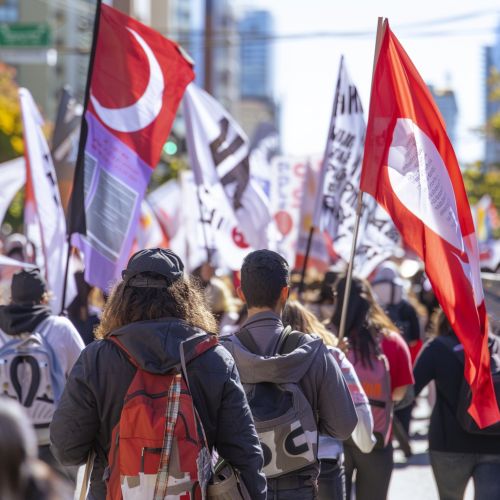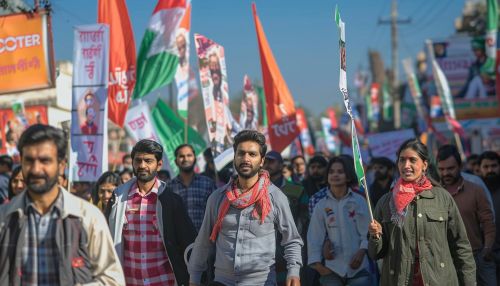Political Sociology
Introduction
Political sociology is a subfield of sociology that focuses on the interplay between society and politics, examining how social structures, power dynamics, and cultural norms influence political behavior, institutions, and policies. It encompasses a wide range of topics, including the formation and function of political institutions, the role of social movements, the impact of social stratification on political participation, and the influence of ideology on political processes.
Historical Development
Political sociology emerged as a distinct field in the late 19th and early 20th centuries, influenced by the works of Karl Marx, Max Weber, and Émile Durkheim. Marx's analysis of class struggle and the role of economic power in shaping political systems laid the groundwork for understanding the relationship between social structures and political power. Weber's exploration of authority, bureaucracy, and the state provided a framework for analyzing political institutions and their legitimacy. Durkheim's focus on social cohesion and collective consciousness highlighted the importance of cultural and social factors in political life.
Key Theoretical Approaches
Marxist Political Sociology
Marxist political sociology centers on the concept of class struggle and the role of economic power in shaping political systems. According to Marx, the state functions as an instrument of the ruling class, maintaining the dominance of the bourgeoisie over the proletariat. This perspective emphasizes the importance of economic structures and material interests in understanding political power and conflict.
Weberian Political Sociology
Max Weber's contributions to political sociology include his analysis of authority, bureaucracy, and the state. Weber identified three types of authority: traditional, charismatic, and legal-rational. He argued that modern political systems are characterized by legal-rational authority, where power is exercised through bureaucratic institutions based on rules and procedures. Weber's work also highlights the role of bureaucracy in shaping political processes and the importance of legitimacy in maintaining political order.
Durkheimian Political Sociology
Émile Durkheim's approach to political sociology focuses on the role of social cohesion and collective consciousness in maintaining political order. Durkheim argued that political institutions and practices are shaped by the moral and cultural values of society. He emphasized the importance of social integration and the role of rituals and symbols in reinforcing collective identities and political solidarity.
Political Institutions and Governance
Political sociology examines the formation, function, and impact of political institutions, including the state, political parties, and interest groups. These institutions play a crucial role in shaping political behavior, policy-making, and governance.
The State
The state is a central focus of political sociology, defined as a political organization with a monopoly on the legitimate use of force within a given territory. The state's functions include maintaining order, providing public goods, and regulating economic and social activities. Political sociologists analyze the state's role in shaping social relations, the distribution of power, and the implementation of policies.
Political Parties
Political parties are organizations that seek to gain and maintain political power by participating in electoral processes and representing specific interests and ideologies. Political sociologists study the formation, structure, and function of political parties, as well as their impact on political participation, policy-making, and governance.
Interest Groups
Interest groups are organizations that seek to influence public policy and decision-making processes without seeking political office. These groups represent specific interests, such as business, labor, or environmental concerns, and use various strategies, including lobbying, advocacy, and public campaigns, to achieve their goals. Political sociologists examine the role of interest groups in shaping political agendas, policy outcomes, and the distribution of power.
Social Movements and Political Change
Social movements are collective efforts by individuals and groups to bring about social or political change. Political sociology explores the origins, dynamics, and impact of social movements, as well as their role in challenging existing power structures and promoting new forms of political participation.
Theories of Social Movements
Several theoretical approaches have been developed to understand social movements, including resource mobilization theory, political process theory, and new social movement theory.
Resource Mobilization Theory
Resource mobilization theory focuses on the resources, such as money, organization, and leadership, that social movements need to succeed. This approach emphasizes the importance of external support and the strategic use of resources in achieving movement goals.
Political Process Theory
Political process theory examines the broader political and social context in which social movements emerge and operate. This approach highlights the role of political opportunities, such as changes in political alignments or state policies, in shaping the success and impact of social movements.
New Social Movement Theory
New social movement theory focuses on the cultural and identity aspects of social movements, emphasizing the role of collective identities, values, and symbols in mobilizing participants and shaping movement goals. This approach is particularly relevant to contemporary movements that address issues such as environmentalism, gender equality, and human rights.
Social Stratification and Political Participation
Political sociology investigates the relationship between social stratification and political participation, examining how factors such as class, race, gender, and education influence individuals' political behavior and access to political power.
Class and Political Participation
Class is a key factor in shaping political participation, with individuals from higher socioeconomic backgrounds generally having greater access to political resources and opportunities. Political sociologists study the impact of class on voting behavior, political engagement, and representation, as well as the ways in which class-based inequalities are reproduced and challenged within political systems.
Race and Ethnicity
Race and ethnicity are important dimensions of social stratification that influence political participation and representation. Political sociologists analyze the impact of racial and ethnic identities on political behavior, as well as the ways in which racial and ethnic minorities mobilize to address issues of discrimination, inequality, and social justice.
Gender and Politics
Gender is another critical factor in shaping political participation and representation. Political sociologists examine the barriers and opportunities for women's political engagement, the impact of gender norms and roles on political behavior, and the ways in which feminist movements and policies address issues of gender inequality and discrimination.
Education and Political Participation
Education is a significant determinant of political participation, with higher levels of education generally associated with greater political knowledge, engagement, and efficacy. Political sociologists study the impact of educational attainment on voting behavior, political activism, and civic engagement, as well as the role of educational institutions in shaping political socialization and attitudes.
Ideology and Political Processes
Ideology refers to a set of beliefs, values, and ideas that shape individuals' and groups' understanding of political and social issues. Political sociology explores the role of ideology in shaping political behavior, policy-making, and governance.
Political Ideologies
Political ideologies, such as liberalism, conservatism, socialism, and nationalism, provide frameworks for understanding and interpreting political and social issues. Political sociologists analyze the origins, development, and impact of different political ideologies, as well as their role in shaping political behavior and policy outcomes.
Ideological Hegemony
The concept of ideological hegemony, developed by Antonio Gramsci, refers to the dominance of a particular ideology within a society, shaping individuals' beliefs and values in ways that support existing power structures. Political sociologists study the mechanisms through which ideological hegemony is maintained and challenged, as well as its impact on political behavior and social change.
Globalization and Political Sociology
Globalization refers to the increasing interconnectedness and interdependence of the world's economies, societies, and political systems. Political sociology examines the impact of globalization on political processes, institutions, and behavior.
Transnational Political Processes
Globalization has led to the emergence of transnational political processes, where political actors, institutions, and issues transcend national boundaries. Political sociologists study the role of international organizations, transnational social movements, and global governance structures in shaping political behavior and policy outcomes.
Global Inequality
Globalization has also contributed to increasing global inequality, with significant disparities in wealth, power, and resources between different regions and countries. Political sociologists analyze the impact of global inequality on political participation, representation, and policy-making, as well as the ways in which marginalized groups mobilize to address issues of global justice and equity.
Cultural Globalization
Cultural globalization refers to the spread of cultural products, practices, and values across national boundaries. Political sociologists examine the impact of cultural globalization on political behavior, identity, and social cohesion, as well as the ways in which cultural exchanges and hybridization shape political processes and institutions.
Conclusion
Political sociology provides a comprehensive framework for understanding the complex interplay between society and politics. By examining the role of social structures, power dynamics, and cultural norms in shaping political behavior, institutions, and policies, political sociology offers valuable insights into the functioning of political systems and the potential for social and political change.
See Also


